Daniel Lim
In a world of ever-evolving entertainment, one form of traditional performance that has continued to captivate and inspire audiences both young and old, even in the fast-paced modernity of today, is Mukun.
Kelab Budaya Mukun Selendang Sutera Brunei (Kelab Budaya Mukun) is one group that has performed and competed against other groups across the nation and internationally.
The Bulletin met with Kelab Budaya Mukun during a practice session that has started again since the lifting of the restrictions.
Club President Irwan Rino bin Nordin cleared the misconceptions that some might have about the traditional art of Mukun which, while traditional in the sense that there is history attached to the art form, does not originate from within the nation itself.
“The culture of Mukun is uniquely tied to Borneo and can’t be found in other ASEAN countries.
“This includes Sarawak, Sabah, Labuan, and Brunei Darussalam.
“Mukun itself originates from Sarawak and is a culture that is held dear to by the communities there.”
Rather than being for entertainment, as it is now, Mukun played a more important role in the past, as it provided an avenue for suitors to find a potential partner.
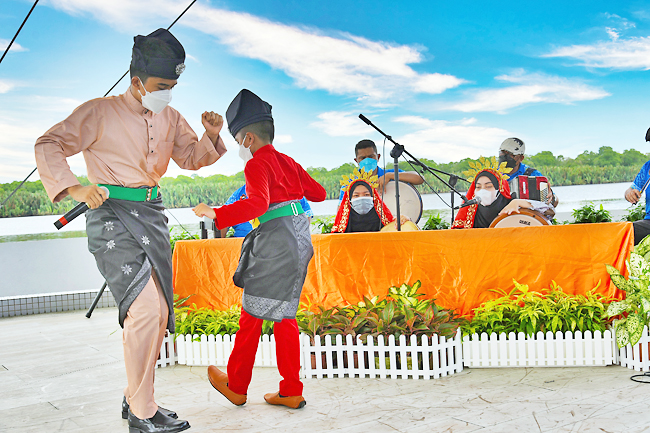
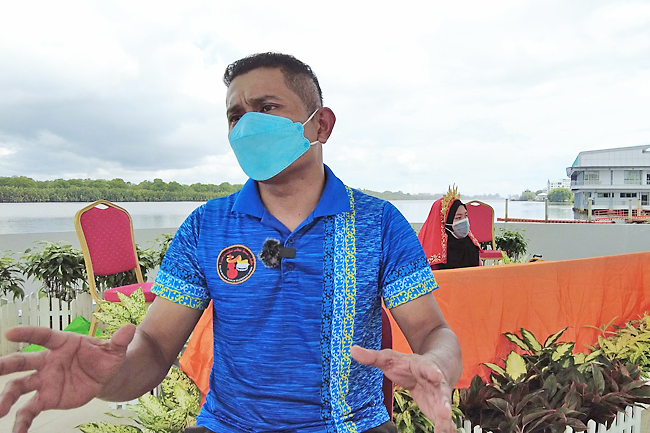
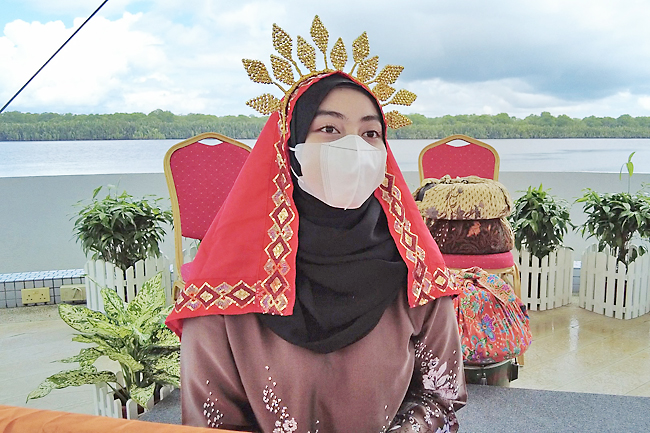
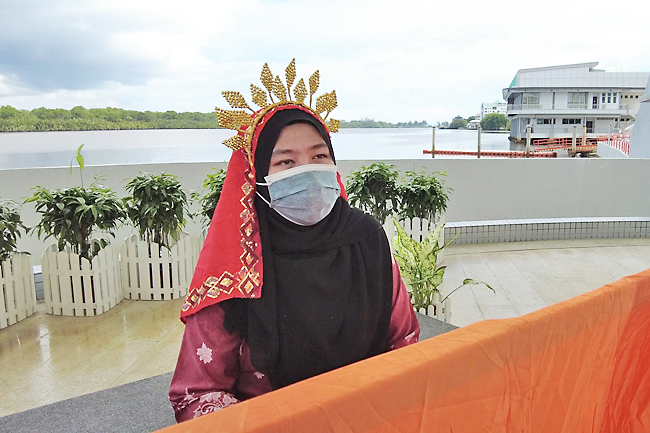
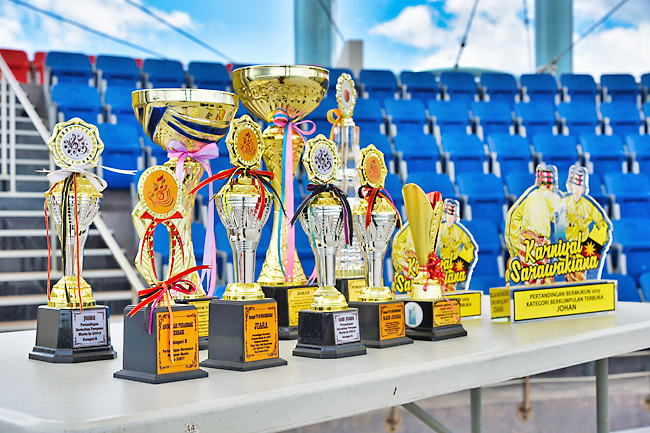
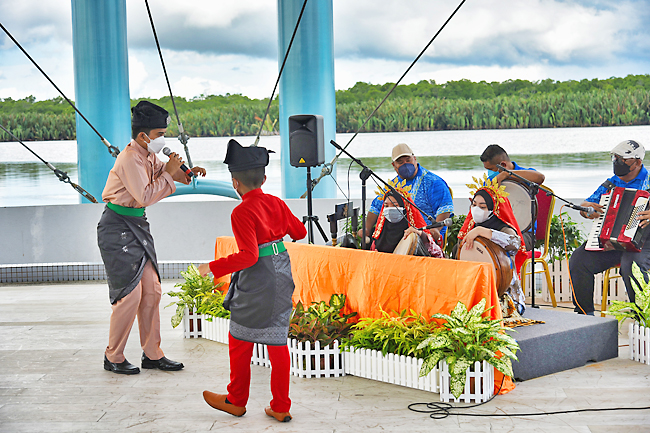
This is still some of the aspects reflected in today’s performance, as Irwan Rino explained about a typical Mukun performance.
“Mukun performers include the male referred to as Penandak and the female referred to as Mak Gendang.”
Usually, in a Mukun performance, there will be at least two Penandak on stage aiming to out-battle each other through poetry and ryhmes that portray themselves positively while also ridiculing the other.
“According to the traditions and rules of Mukun, the Mak Gendang will ‘sell’ a poem to the Penandak, which is then answered by the Penandak backed by the beat created by the Mak Gendang using drums or dombak, accompanied by classical instruments such as viola and accordions.”
Traditionally, the Mak Gendang had a special seat in the middle of the stage behind a cloth curtain, with the Penandak each taking turns to impress her with their poetry.
As Mukun was for suitors to find potential partners, this meant that the intermingling of cultures was bound to occur. Mukun became a staple household performance that played a core role in creating new families, and still enjoyed as a tradition by many in the present.
Groups such as Kelab Budaya Mukun have contributed to the longevity of the tradition by continuing to practise and perform Mukun, which has since become part of culture and tradition in the Sultanate.
“From the birthday celebration of His Majesty Sultan Haji Hassanal Bolkiah Mu’izzaddin Waddaulah ibni Al-Marhum Sultan Haji Omar ‘Ali Saifuddien Sa’adul Khairi Waddien, Sultan and Yang Di-Pertuan of Brunei Darussalam, to annual competitions, to winning in international Mukun competitions, Kelab Budaya Mukun is actively creating and partaking in opportunities to help continue the spirit and tradition of Mukun,” shared Irwan Rino. This continued effort and initiative created by the club and relevant agencies serve not only to broaden the scope of Mukun but also extends to inspiring youth to practise and follow in the seniors’ footsteps.
One such youth inspired to take up the reins of being a Mak Gendang is Nurul Syafiqah binti Haji Antin, who started practising Mukun in 2019 after participating in a competition.
“At first, I started Mukun from a competition organised by the Department of Co-Curriculum Education in 2019. We were placed third representing Berakas Secondary School,” Nurul Syafiqah said.
The competition was her first experience in performing Mukun.
“At first, I didn’t have any interest in Mukun, but that changed after participating in the workshop and the competition.
“I hope more youth will enter and practise Mukun, maybe from workshops or other related activities, to learn about Mukun performances and how to be Mak Gendang.”
Similarly, Siti Nur Rabiatul Adawiyah Batrisya binti Mohd Norajame who joined Nurul Syafiqah shared the same sentiment while also delving into the challenges they faced in learning and practising Mukun during the heights of the pandemic.
“During COVID, we were always in contact through WhatsApp, and took time to learn by ourselves before recordings and performances related to Mukun.
“It can be challenging trying to learn online compared to face-to-face, which allows clearer communication and makes it easier to understand and correct mistakes during practise.”
She said she continues to polish her skills as a Mak Gendang in performing Mukun and that the lifting of the restrictions has been a boon as she can continue to learn and practise with veterans of the art.
Having strong feelings about practising and performing Mukun, Siti Nur Rabiatul Adawiyah Batrisya expressed her desire to improve in playing instruments and poems, and hoped that youth interested in Mukun will partake in cultural clubs.
Raising interest in Mukun represents one of the many initiatives in line with the mission and vision of the Kelab Budaya Mukun, to inspire youth and create the next generation that will carry on the legacy, tradition and culture of Mukun.
With their work on spreading interest, Irwan Rino is optimistic about the prospects for the tradition, saying, “We hope to continue to conduct roadshows and workshops on Mukun for youth to help them be inspired, as it can be fun to appreciate such an old culture.
“If we were to let it be, it will be a culture that will be lost forever, a tradition lost,” he added.
“We hope that steps will be in place to ensure that Mukun will stay for the foreseeable future.”






